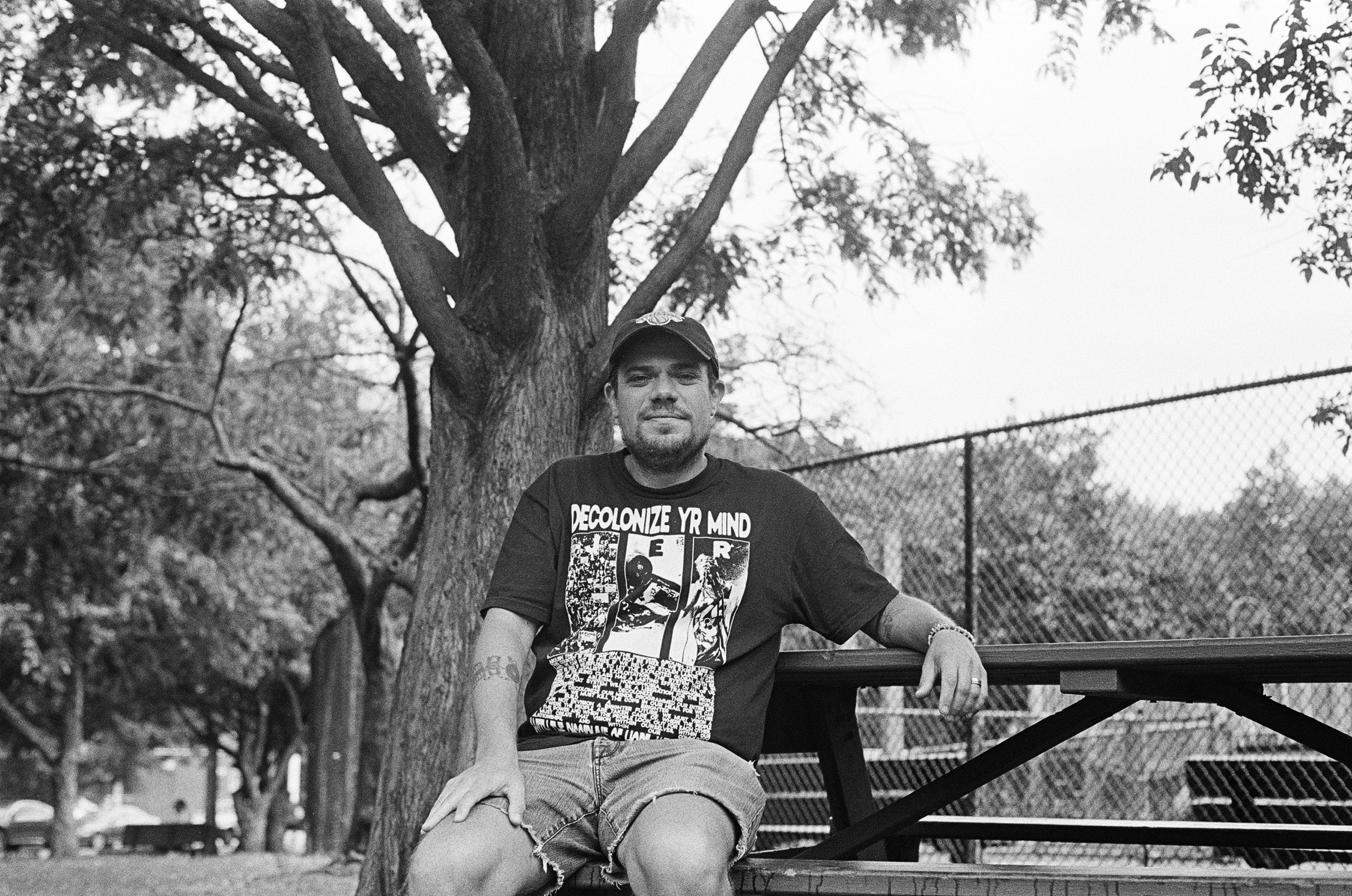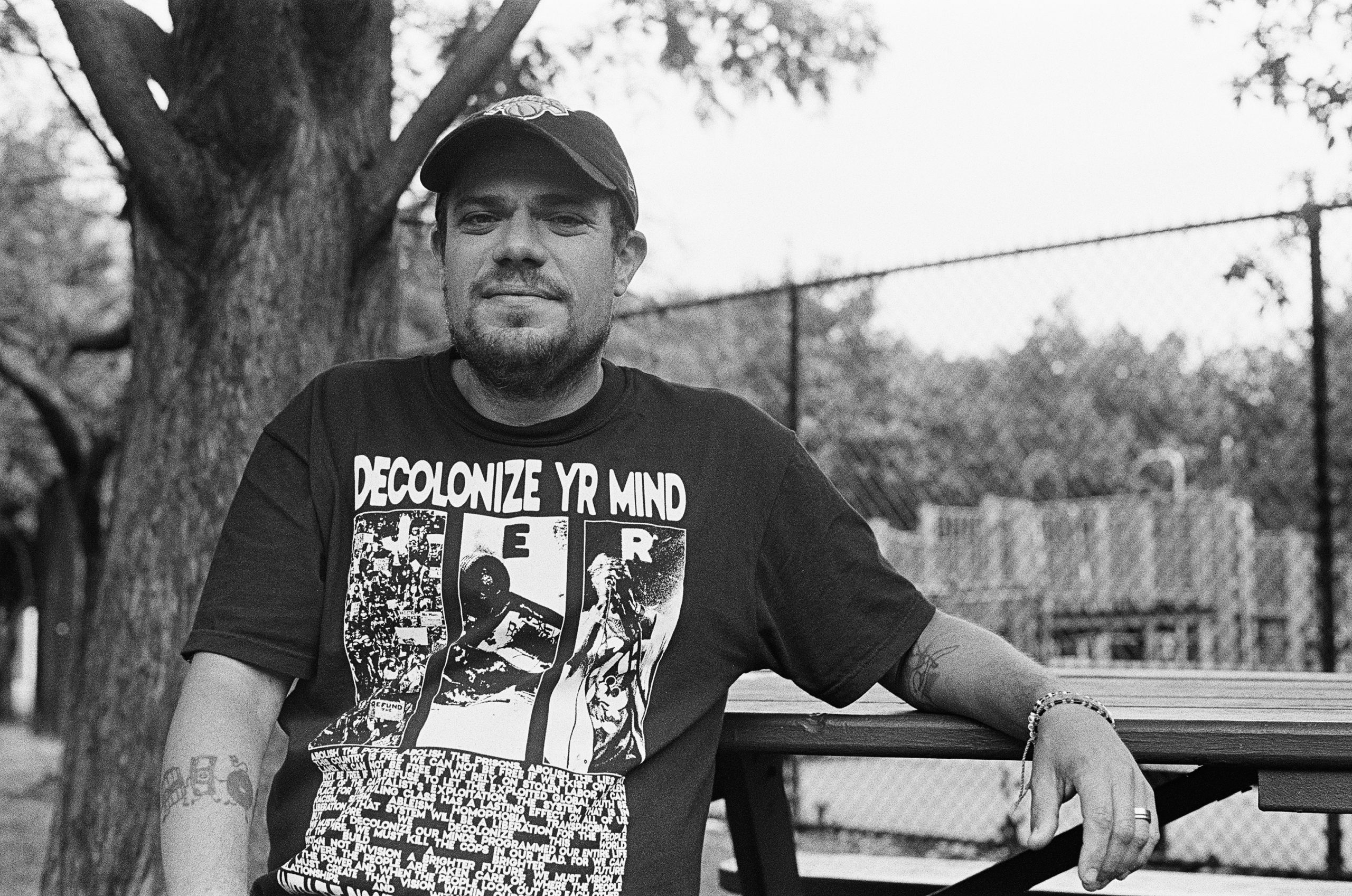“Seventy-five hundred…dollars…for us…to play this festival,” Jeff Rosenstock said flirtatiously on stage at Pitchfork Music Festival back in 2017.
“Just don’t believe any of this shit,” he said at the time, “just because you’re charging your phone at the HBO’s Insecure charging station doesn’t mean you have to like that show. Fuck it.”
Seven years later, Jeff Rosenstock is back at Pitchfork Music Festival and still doesn’t believe in any of this shit. On stage, he screams, “Fuck Nestle and fuck the Nespresso lounge!” through a microphone that Nestle (at least partially) paid for. Jeff Rosenstock’s ability to remind everyone exactly what they stand for and still run away with the money has been one of his defining traits throughout his career.
Despite perseverant resistance to the powers that be, Jeff Rosenstock has seen only seen his purview expand in the last seven years. The onset of the pandemic saw the release of NO DREAM, a surprise release recorded just three months prior. A ska-ified edition, SKA DREAM, followed in 2021. The following year saw HELLMODE, a late career nomination for his magnum opus. Since 2017, he’s also composed the score for Craig of the Creek, the Cartoon Network show that received a film adaptation last year, for which he also composed.
Speaking to him at Pitchfork Music Festival 2024, just hours before he’s set to play an afternoon set, he’s fairly aloof. Chicago is one of the last stops on the globetrotting tour he’s been on practically since HELLMODE was released late summer in 2023. After some loose dates in Colorado, Montana, and Oregon, he’s taking a short break before taking a trip back to his hometown, New York. There, he’s set to play an indeterminate number of shows at Warsaw in Brooklyn.

After a previous show in Jersey City sold out and scalpers began gouging prices, Rosenstock decided to switch up the model he’s been touring with his career. “There’s a method where you play the room you think can sell out, and then you sell it out, and the next time you get more money and play in a bigger room,” he says, “how do we do this so we don’t do that? Because I don’t really wanna do that. I want to play for everyone who wants to see us.”
The solution was a residency model marketed as infinite. A sold out show meant another date at the same venue was set, which meant any billionaire fan (if Jeff Rosenstock could even attract those) could keep Rosenstock trapped in Brooklyn forever.
It’s the latest in a streak of downright zany ideas Jeff Rosenstock has pulled off. Whether it’s the “You, in Weird Cities” music video that found the band playing shows in all five NYC boroughs in one day, or the surprise-release NO DREAM and its SKA DREAM accompaniment, Jeff Rosenstock has always been on the cutting edge of doing whatever his heart desires.
Jeff Rosenstock is never unpredictable for the sake of it. With his music, he never necessarily approaches the ring with an expectation of besting or even expanding on his previous work, “‘cause that’s insane. But a part of me thinks, ‘Why put out another record if it isn’t better than your last record, and also why make something you’ve made before?”
There’s never a sense of betterment when executing these out-of-the-box ideas either. “It’s less setting boundaries, and more so lighting a stick of dynamite and throwing it in a room. You know that the dynamite is in there and something is going to happen because you did that, but you don’t really know what the end result is going to be.”
After an appearance at Pitchfork Music Festival, Jeff Rosenstock will spend the rest of the year in the wind, taking HELLMODE to Japan, Korea, and Australia, having already toured the 48 states and Europe.
“Let’s just leave it open ended,” Rosenstock says of the Warsaw shows at Pitchfork, “if show seven sells out, we’re going to be playing a show to 40 people in this giant room on the eighth. I think we’re both dreading that and hoping that it happens.”


There are already people lined up when I walk by Warsaw at 3pm. It’s the eighth and final show of the Brooklyn residency, scheduled after the previous show had sold out just the night before. I talk to Jeff a handful of hours before sound check. It feels like I’ve walked in on the waning days of a junior high summer camp. After our conversation, we walk out of the venue and he’s taken aback by the small queue that formed, sheepishly thanking the small handful of punks, young and old, that have dedicated their afternoon to securing good view of Rosenstock.
Jeff Rosenstock seems incredibly at home during our time together. He tells me he’s spent the better part of his time in New York visiting old friends and catching up with the city. He had lived in Greenpoint before departing for Los Angeles in 2020. During his tenure in the area, Warsaw was his neighborhood venue. It’s the venue that hosted the final show of his previous band, Bomb the Music Industry!,and the hall that he got married in. When he began patronizing the venue, it was little more than a quirky pierogi-serving neighborhood venue. Even now, as a Live Nation property, he’s very clearly still on home territory.
A born and raised New Yorker—Long Island to be exact—Jeff Rosenstock grew up in an extremely ideal time, culturally, to experience New York as an adolescent. The New York music scene of the 90’s, punk or otherwise, was a far cry from the loft mythologies of the 70’s, or the our-band-could-be-your-life 80’s. Jeff was indoctrinated with DIY by the time he started his first band, The Arrogant Sons of Bitches, in the late 90’s. ASoB, as they’re known, persisted through Jeff’s college tenure at NYU. The band’s resume included an instance when a rowdy renegade show outside of Warped Tour turned into an invitation to play the famed rock tour in San Diego and Long Beach.
After graduating in 2004, ASoB released their magnum opus, Three Cheers for Disappointment, in 2006, before calling it quits in ‘07. He’s never stopped embodying his DIY roots in the 20 years since ASoB disbanded. Bomb the Music Industry!, his next endeavor, was self explanatory on its perspective. The group ran for a decade before calling hiatus in 2012, when Rosenstock released his first project under his own name, I Look Like Shit. Though his eponymous project has reached heights neither of his former bands ever broached, Jeff Rosenstock has stayed grounded, even as his cultural clout vastly expands.
On Labor Day last year, before embarking on the initial HELLMODE tour, Rosenstock decided to post merch cuts, which is the share of money venues would take from merchandise revenue sold at shows. He wasn’t trying to incite any swaths of discourse or initiate any grand change, he was simply hoping to explain that “if you see that our shirts [or tickets] cost more somewhere, this is why,” he claimed.
Dozens of bands echoed the sentiment, corporate bootlickers shook their angry and empty fists, and “some heroes of mine came at me about it.” The post took a life much larger than the one Rosenstock imagined. It seemed like no small coincidence when, just weeks later, Live Nation announced a program that canceled merch fees at all of its venues, as well as offered a small stipend towards headliners and opening bands who toured through its venues.
“I don’t know if it had anything to do with us, but cool,” he said, “because the best part of that whole program that they implemented, as far as I’m concerned, is that support bands get that extra money and support bands don’t have to pay that extra merch cut. That is huge for them.”
It’s no surprise, then, there’s an Ian MacKaye-esque fervor developing around Jeff Rosenstock. Hundreds of bands spend their days hoping to strike it big while balancing their DIY ethics. Many of them give it up one way or another, but it does feel like Jeff Rosenstock has cracked the code.
“A lot of people talk about community, generosity, doing music for love and not for money, etc.. But because of how hard this line of work is, a lot of bands can’t really walk the talk, especially behind the scenes. I totally get why it’s like that: this job is extremely difficult, and it’s hard enough to help yourself, let alone help someone else,” said Greg Katz, singer and guitarist of Los Angeles DIY three-piece Cheekface, whose single “Flies” features Jeff on baritone sax. “But Jeff is somebody who, when nobody is looking, still demonstrates such an uncommon generosity of spirit. He’s done such nice things for us, and we are literally just some other band.”
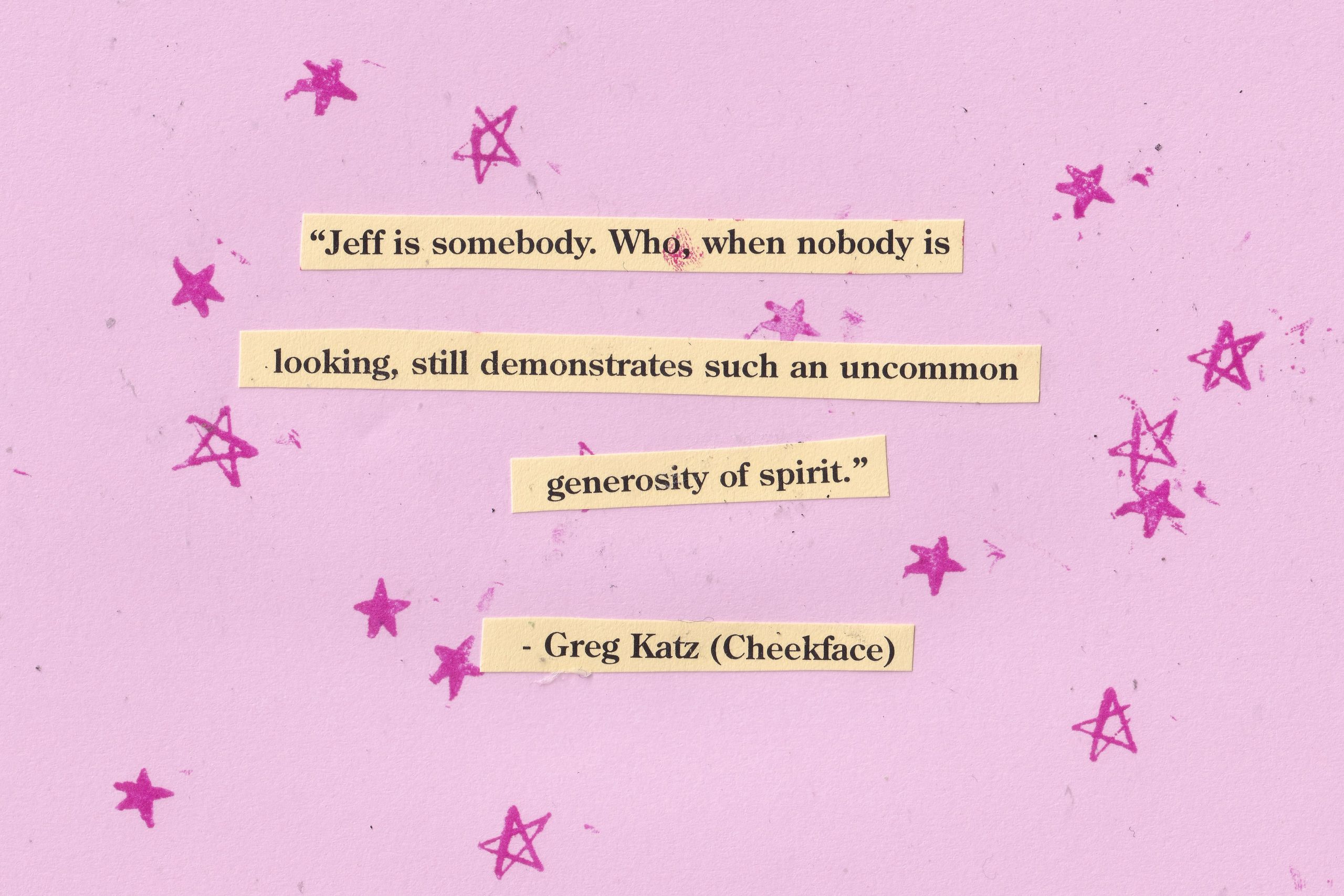
Katz recalls a story where, during a touring stint with Rosenstock, weather forced delays on Cheekface’s part and they risked missing their slot. Rosenstock offered to stop his set whenever they showed up and have them play on his gear. “I think that’s why he’s become such a lodestar for people in the indie music community.”
Thanks to his time in the DIY punk scene, much of the glitz and glamor of the rock star was stripped away long ago. “Less Than Jake would play a show in a church basement and the horn players in my band would hop up for ‘My Very Own Flag.’ It felt very democratized, it broke down that wall between musician and crowd,” he said. “Playing with some of those bands, like Catch-22, who I loved—, they were all really nice people. The shit I like is already very anti-hero to begin with. When I meet people who are freaking out, I always try and go “woah, okay. I’m also just a weird person navigating this planet as well.”
Across eight nights at Warsaw, Jeff Rosenstock plays a set of shows that span nearly every single song, collaboration, and side project he’s produced in the last ten years. The crowds span fans both committed to the bender with Jeff, and those looking for something to do with a late summer night. The shows only get more mangled and expansive each night. The collection of shows is undeniably the crowning achievement of Jeff Rosenstock’s touring career. Appearances from longtime associates like Laura Stevenson, Chris Valentino, and Chris Farren, round out 35 song setlists full of old deep cuts, forgotten collaborations, and, of course, recent crowd pleasers. On night five, Jeff covers three Neil Young songs with his ex-Bomb the Music Industry! bandmate Laura Stevenson, who Jeff credits with getting him into Young.
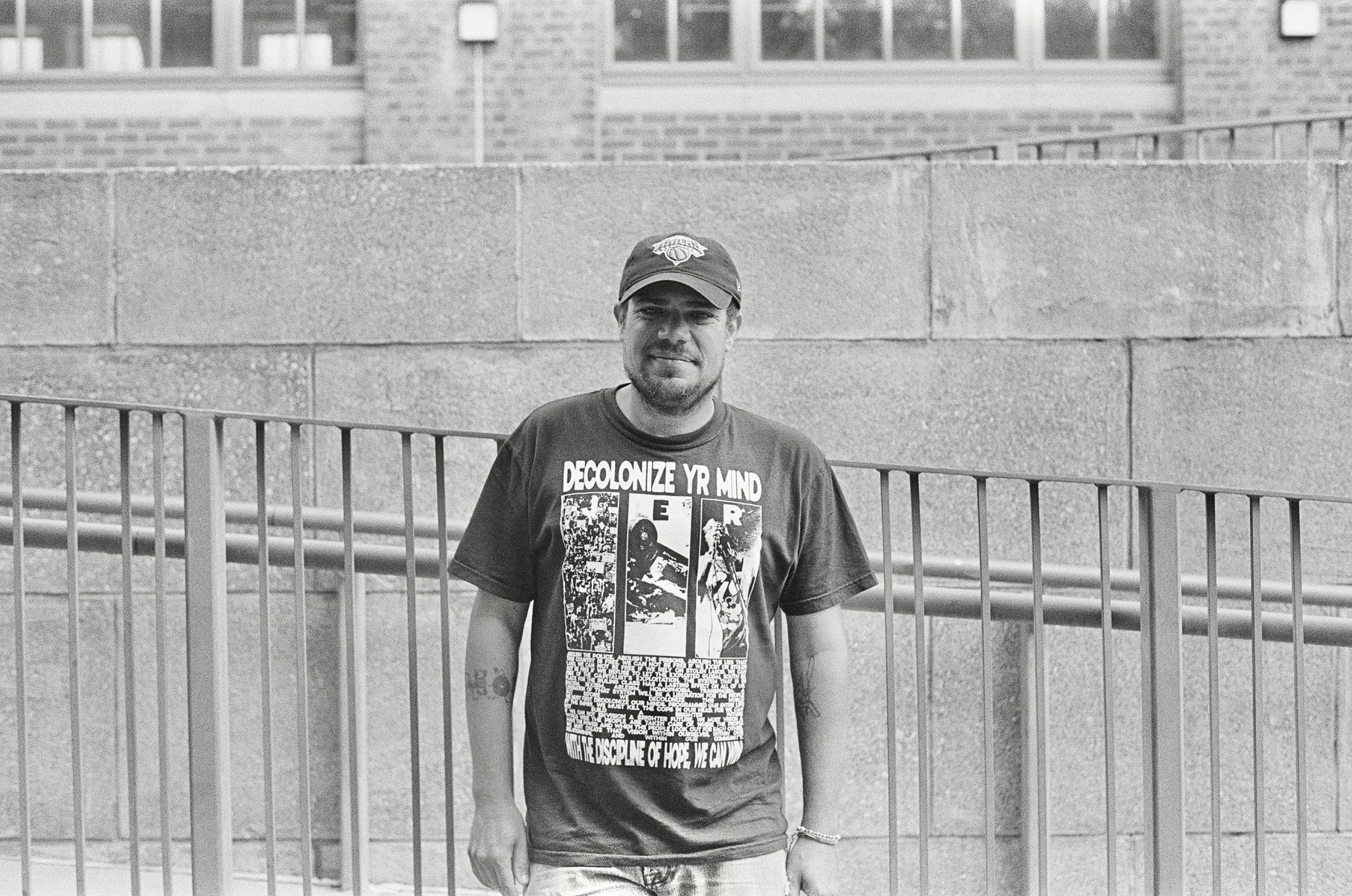
Like many other poets and punks before him, Jeff draws deep influence from Young’s confrontational lyricism, which leveled the kind of discomfort that punk music has sought after since the time of Iggy Pop. When Jeff writes the lines “Will you still love me after I’ve fucked up?,” it strikes the same chords as when Young sings “I’m deep inside myself but I’ll get out somehow, And I’ll stand before you, and I’ll bring a smile to your eyes.”
“I’m trying to make shit that makes you feel shit; that’s just the music I like,” Rosenstock said. “I’m just trying to write myself out of a depression half the time. It’s very nice when it has that for people, but it’s so much catharsis and therapy for me that, if it didn’t have that effect, I would still do it the same way, because I’m just trying to fix what’s wrong with me.”
“It doesn’t necessarily make you feel sad to listen to it as much as it can make you feel not alone if you are sad, which makes you feel good, and it’s that resonance,” he tells me.
It’s arguably the aspect of Jeff Rosenstock’s songwriting that has allowed it to resonate so widely; the vulnerability he brings to his pen is unparalleled by any of his contemporaries. While many choose to point their swords towards the world around them, Rosenstock looks inwards.
“It is very, very vulnerable. I am always trying to figure out how to write lyrics that feel effective to me that aren’t just ‘let me tell you about the worst thing that’s ever happened in my life. I think there’s a thing with some people who write where you feel like if you do get yourself out of depression or anxiety…are you still going to be able to write?” Rosenstock said, “I’ve very much been trying to find ways I feel comfortable writing about [things other] than the dark times. I feel like it’s a crutch for my songwriting. Where else can I take it that doesn’t feel like it’s dependent on me being miserable, because I don’t wanna be miserable.”
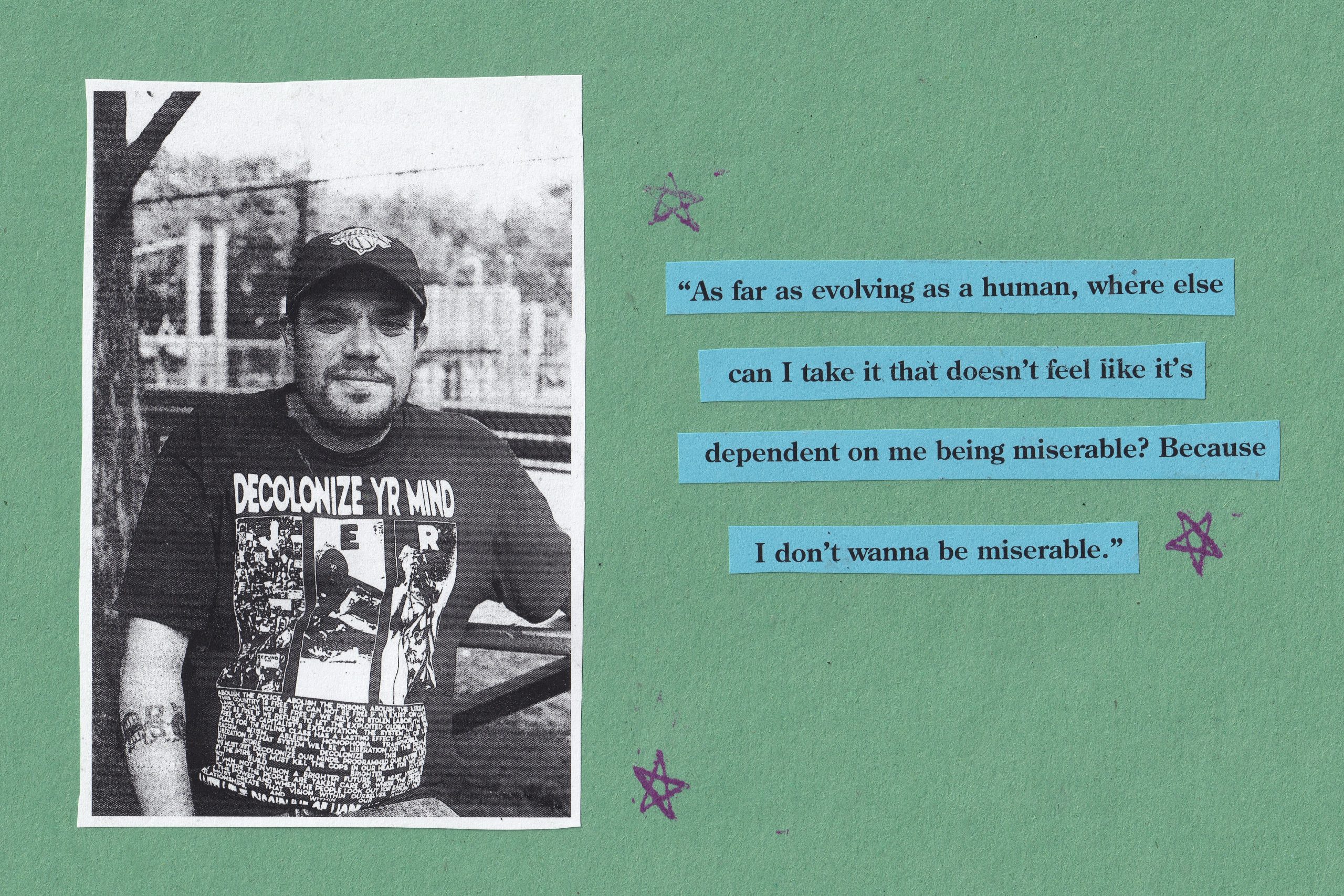
By both releasing his music into the world and embracing the communities he’s fostered through the process, the answer to alleviating misery seemed to be found in the world outside of his own four walls. “Being around [the Long Island scene and US DIY touring scene] and just watching everybody helping each other out, that [ethos] has certainly been instilled in me through punk since I got into this shit,” he said. “Being part of this world where other people were also trying to be kind was definitely part of my core. Knowing that even if I was alone, I wasn’t alone in the world.”
It’s not unfair to look at the material reality of the world and feel like the fights for the individual self and the collective good stand in opposition of one another. The vague idea of making a “difference” feels less like an attainable goal and more of a child or a politician’s pipe dream. There may just not be enough good in the world to go around.
For Jeff Rosenstock, the opposite is true.
“What can you do to make a difference? Well, just be nice to the people you meet. Just be nice to somebody. Somebody might be having a shitty day, and being nice to that person will make their day a little bit less shitty,” he said. “They want you to feel like you can’t change anything and everything is hopeless, because then you don’t do anything. You become cynical and detached, and you become despondent. They don’t have control over how you act to another person, and they never really will. That does make a difference. It doesn’t fucking fix the world. It doesn’t bring back Roe V. Wade, but it does make a tiny little part of somebody’s life a little bit better.”
